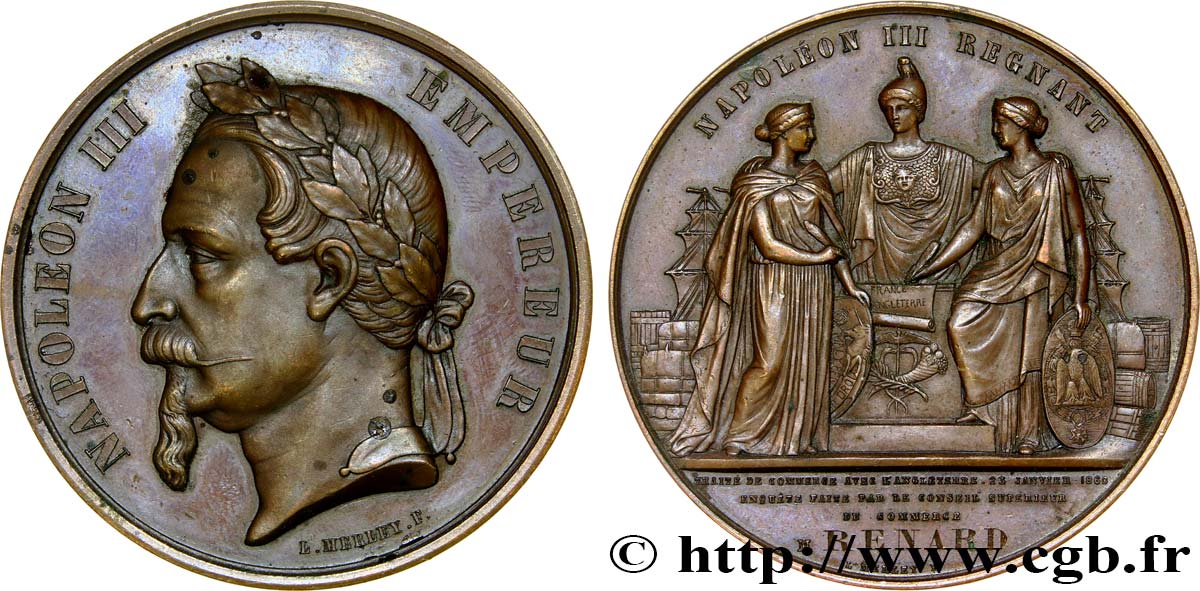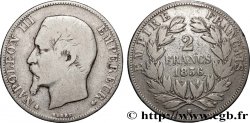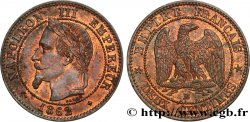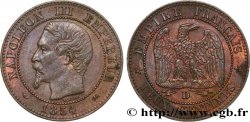E-auction 494-404647 - fme_423532 - ZWEITES KAISERREICH Médaille, Traité de commerce franco-anglais
Sie müssen angeschlossen sein und von cgb.fr genehmigt werden, um in einer E-Auktion teilzunehmen.Melden Sie sich an, um zu wetten..Die Kontobestätigungen sind innerhalb von 48 Stunden nach Ihrer Anmeldung gemacht.Warten Sie nicht bis die letzten zwei Tage vor dem Abschluss eines Verkaufs, um Ihre Registrierung abzuschließen. Klickend "BIETEN" verpflichten Sie sich vertraglich, diesen Artikel zu kaufen und Sie nehmen ohne Reserve die allgemeinen Verkaufsbedingungen für den e-auctions zu cgb.fr an.
Der Verkauf wird an der Zeit auf der Übersichtsseite angezeigt geschlossen werden. Angebote, die nach der Schließung Zeit empfangen sind, werden nicht gültig.
Bitte beachten Sie, dass die Fristen für die Einreichung Ihres Angebots auf unsere Server können variieren und es kann zur Ablehnung Ihres Angebots entstehen, wenn es in den letzten Sekunden des Verkaufs gesendet wird. Die Angebote sollen mit ganzer Zahl ausgeführt sein, Sie können Kommas oder des Punktes in Ihrem Angebot nicht erfassen. Bei Fragen klicken Sie hier, um einen Blick auf die FAQ E-Auktionen.
KEINE ANSCHAFFUNGSKOSTEN FÜR DIE KÄUFER.
KEINE ANSCHAFFUNGSKOSTEN FÜR DIE KÄUFER.
| Schätzung : | 200 € |
| Preis : | 82 € |
| Höchstgebot : | 191 € |
| Verkaufsende : | 03 Oktober 2022 18:12:00 |
| Bieter : | 13 Bieter |
Type : Médaille, Traité de commerce franco-anglais
Datum: 1860
Name der Münzstätte / Stadt : France
Metall : Kupfer
Durchmesser : 57,5 mm
Stempelstellung : 12 h.
Graveur MERLEY Louis (1815-1883)
Gewicht : 91 g.
Rand lisse + abeille CUIVRE
Punze : Abeille (1860 - 1880) CUIVRE
Kommentare zum Erhaltungszustand:
Superbe médaille avec une jolie patine sombre et brillante
Vorderseite
Titulatur der Vorderseite NAPOLÉON III - EMPEREUR.
Beschreibung Vorderseite Tête laurée à gauche de Napoléon III.
Rückseite
Titulatur der Rückseite NAPOLÉON III RÉGNANT // TRAITÉ DE COMMERCE AVEC L'ANGLETERRE. 23 JANVIER 1860 / ENQUÊTE FAITE PAR LE CONSEIL SUPÉRIEUR / DU COMMERCE.
Beschreibung Rückseite Minerve, casquée, vêtue à l’antique, réunit la France et l'Angleterre autour d'un autel où elles signent un parchemin déroulé sur lequel figure : FRANCE / ANGLETERRE. Signé : L. MERLEY .F.
Kommentare
Médaille signée L. MERLEY. F. pour Louis Merley, attribuée à Mr RENARD.
Le 15 janvier 1860, Le Moniteur, journal officiel de l'Empire français, publie une lettre de Napoléon III à son ministre d'État, le banquier Eugène Fould. « Depuis longtemps, écrit l'empereur, on proclame cette vérité qu'il faut multiplier les moyens d'échanges pour rendre le commerce florissant ; que sans concurrence l'industrie reste stationnaire et conserve des prix qui s'opposent aux progrès de la consommation. » Ce manifeste libre-échangiste annonce un changement radical de politique commerciale de la France.
Quelques jours plus tard, un traité de commerce est signé entre la France et le Royaume-Uni, les deux premières puissances économiques d'alors, par Michel Chevalier, ancien saint-simonien et Richard Cobden, qui, en 1846, après quinze ans de luttes, était parvenu à obtenir la suppression unilatérale des droits anglais sur le blé, les fameuses « corn laws ».
cf. http://www.latribune.fr/opinions/tribunes/20130701trib000773334/libre-echange-le-precedent-de-1860.html.
Medal signed L. MERLEY. F. for Louis Merley, awarded to Mr RENARD. On January 15, 1860, Le Moniteur, the official journal of the French Empire, published a letter from Napoleon III to his Minister of State, the banker Eugène Fould. \\\"For a long time,\\\" wrote the Emperor, \\\"the truth has been proclaimed that it is necessary to multiply the means of exchange to make trade flourish; that without competition, industry remains stationary and maintains prices that oppose the progress of consumption.\\\" This free-trade manifesto announced a radical change in France's commercial policy. A few days later, a trade treaty was signed between France and the United Kingdom, the two leading economic powers at the time, by Michel Chevalier, a former Saint-Simonian, and Richard Cobden, who, in 1846, after fifteen years of struggle, had succeeded in obtaining the unilateral abolition of English duties on wheat, the famous \\\"corn laws.\\\" cf. http://www.latribune.fr/opinions/tribunes/20130701trib000773334/libre-echange-le-precedent-de-1860.html
Le 15 janvier 1860, Le Moniteur, journal officiel de l'Empire français, publie une lettre de Napoléon III à son ministre d'État, le banquier Eugène Fould. « Depuis longtemps, écrit l'empereur, on proclame cette vérité qu'il faut multiplier les moyens d'échanges pour rendre le commerce florissant ; que sans concurrence l'industrie reste stationnaire et conserve des prix qui s'opposent aux progrès de la consommation. » Ce manifeste libre-échangiste annonce un changement radical de politique commerciale de la France.
Quelques jours plus tard, un traité de commerce est signé entre la France et le Royaume-Uni, les deux premières puissances économiques d'alors, par Michel Chevalier, ancien saint-simonien et Richard Cobden, qui, en 1846, après quinze ans de luttes, était parvenu à obtenir la suppression unilatérale des droits anglais sur le blé, les fameuses « corn laws ».
cf. http://www.latribune.fr/opinions/tribunes/20130701trib000773334/libre-echange-le-precedent-de-1860.html.
Medal signed L. MERLEY. F. for Louis Merley, awarded to Mr RENARD. On January 15, 1860, Le Moniteur, the official journal of the French Empire, published a letter from Napoleon III to his Minister of State, the banker Eugène Fould. \\\"For a long time,\\\" wrote the Emperor, \\\"the truth has been proclaimed that it is necessary to multiply the means of exchange to make trade flourish; that without competition, industry remains stationary and maintains prices that oppose the progress of consumption.\\\" This free-trade manifesto announced a radical change in France's commercial policy. A few days later, a trade treaty was signed between France and the United Kingdom, the two leading economic powers at the time, by Michel Chevalier, a former Saint-Simonian, and Richard Cobden, who, in 1846, after fifteen years of struggle, had succeeded in obtaining the unilateral abolition of English duties on wheat, the famous \\\"corn laws.\\\" cf. http://www.latribune.fr/opinions/tribunes/20130701trib000773334/libre-echange-le-precedent-de-1860.html








 Berichten über einen Fehler
Berichten über einen Fehler Die Seite drucken
Die Seite drucken Teilen meiner Auswahl
Teilen meiner Auswahl Stellen Sie eine Frage
Stellen Sie eine Frage Einlieferung/Verkauf
Einlieferung/Verkauf
 Details
Details










